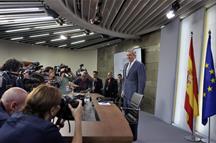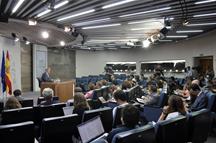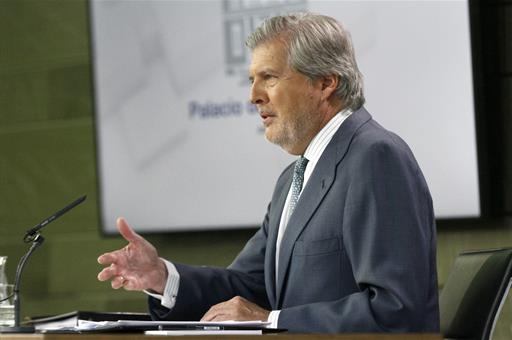Council of Ministers
Government claims that State's obligation is to prevent referendum being held on 1 October
Council of Ministers - 2017.9.29
Moncloa Palace, Madrid
The Government Spokesperson and Minister for Education, Culture and Sport, Íñigo Méndez de Vigo, stressed at the press briefing following the Council of Ministers that "no referendum will be held in Catalonia on 1 October".
Íñigo Méndez de Vigo recalled that the law regulating the referendum was approved despite the warnings made by the legal counsel and Secretary-General of the Regional Parliament of Catalonia and the warning made by the Council for Statutory Guarantees that it was unconstitutional. And both this law and the decrees to call the referendum were suspended by the Constitutional Court.
He remarked that this is a referendum without an Electoral Board or a neutral election campaign, ballot slips, polling stations, an official census or authorised premises. The Government Spokesperson also pointed out that the Spanish Data Protection Agency, in response to citizen enquiries, reported that the potential breach by those individuals manning polling stations in the event of handling and transferring data could lead to fines of up to 300,000 euros.
 Pool Moncloa/ JM Cuadrado"Regional President Puigdemont said that voting would take place as always before, but what we are seeing is that he wants voting to take place regardless", remarked Íñigo Méndez de Vigo.
Pool Moncloa/ JM Cuadrado"Regional President Puigdemont said that voting would take place as always before, but what we are seeing is that he wants voting to take place regardless", remarked Íñigo Méndez de Vigo.
The minister underscored that the referendum not only breaches Spanish law, but also international order, and particularly European law. "It is public and well-known that the Government of Spain has received the unanimous support of each and every one of the European institutions and of each and every Member State of the European Union", stated the minister. The Venice Commission - the supreme body of the Council of Europe that oversees the legality of electoral processes - also pointed out that this referendum fails to meet the Commission's standards.
A referendum against the people of Catalonia
"The State and all the members of the government are under a legal obligation to prevent the referendum being held", said Íñigo Méndez de Vigo. He maintained that those responsible for the situation are the political leaders of the Regional Government of Catalonia and the parliamentary members of the CUP [Popular Unity Candidature], who "will be held personally liable with their own assets depending on the rulings handed down by the courts of justice", he stressed.
The minister argued that "this attempt at holding a referendum is directed against the people of Catalonia" and he expressed the government's concern at the side effects in the form of the "fragmentation of Catalan society" and the "dynamic of confrontation" that weakens the structure of the region of Catalonia. "The government wishes to reiterate that only by fully re-establishing the principle of legality can the democratic co-existence of all the people of Catalonia be restored" he declared.
 Pool Moncloa/ JM CuadradoMéndez de Vigo once again denounced the harassment meted out to that those who have refused to collaborate with the illegal referendum, affecting political parties, journalists, courts and law enforcement agencies. In this regard, he commented on the obligation of the Mossos d'Esquadra to remain loyal to the constitutional and statutory order, guaranteeing that the law is upheld and answering, as judicial police officers, to the system of justice. He also described the use of children at propaganda events of the pro-independence groups as "contemptible".
Pool Moncloa/ JM CuadradoMéndez de Vigo once again denounced the harassment meted out to that those who have refused to collaborate with the illegal referendum, affecting political parties, journalists, courts and law enforcement agencies. In this regard, he commented on the obligation of the Mossos d'Esquadra to remain loyal to the constitutional and statutory order, guaranteeing that the law is upheld and answering, as judicial police officers, to the system of justice. He also described the use of children at propaganda events of the pro-independence groups as "contemptible".
The Government Spokesperson asserted that the government will meet "its constitutional obligation to ensure that the law is upheld, and will respond firmly in the interest of maintaining civil order and not further weakening the already badly damaged social balance".
Laws appealed against as unconstitutional
The Council of Ministers authorised the President of the Government to lodge three appeals against the unconstitutional nature of three regional Catalan laws: in relation to the Social Protection Agency of Catalonia, to measures to protect the right to a dwelling of those people at risk of exclusion, and to digital intent.
Íñigo Méndez de Vigo highlighted that the appeals relate to specific points of these laws that affect the State's powers. In the case of the Law on Digital Intent, he specified that the government asked the Regional Government of Catalonia to set up a bilateral commission to seek an agreement; since this has been refused, the government will resort to the Constitutional Court in order to resolve the issue.
Journalist Hamza Yalçin will not be extradited
 Pool Moncloa/ JM CuadradoThe government agreed to halt the court process to extradite the journalist of Swedish and Turkish nationality Hamza Yalçin.
Pool Moncloa/ JM CuadradoThe government agreed to halt the court process to extradite the journalist of Swedish and Turkish nationality Hamza Yalçin.
The Government Spokesperson explained that Hamza Yalçin was arrested on 3 August in Barcelona under an international arrest warrant issued by a Turkish court accused of an alleged offence of founding and running the terrorist group the People's Liberation Front-Party of Turkey.
Íñigo Méndez de Vigo added that the Passive Extradition Act and the Convention on Refugee Statute establish that extradition will not be granted when the person subject to the extradition order has been granted the status of refugee. Since the Swedish authorities granted asylum to Hamza Yalçin on two occasions and was subsequently granted Swedish nationality, the government decided not to extradite the journalist.
Subsidies for shipbuilding sector
The government approved two Royal Decrees that update the regulation on subsidies for shipbuilding. This aid, renewed until the year 2020, seeks to promote the modernisation of the shipbuilding sector and improve its competitiveness at an international level.
These new laws boost the lines of financial support for shipbuilders to build vessels in excess of 100 gross tonnage and will also benefit the R&D+i projects of shipbuilders.
Greater European integration
 Pool Moncloa/ JM CuadradoAt Friday's Council of Ministers, the Minister for Foreign Affairs and Cooperation, Alfonso Dastis, presented a report on the political situation in Europe and the Brexit negotiations.
Pool Moncloa/ JM CuadradoAt Friday's Council of Ministers, the Minister for Foreign Affairs and Cooperation, Alfonso Dastis, presented a report on the political situation in Europe and the Brexit negotiations.
Íñigo Méndez de Vigo said that the Government of Spain "very positively values" the work being undertaken by the EU's Chief Negotiator, Michel Barnier, following the position adopted that the conditions for the withdrawal by the United Kingdom must first be negotiated prior to establishing any future relations between the UK and the EU.
The Government Spokesperson advocated "improving and extending European integration" and expressed Spain's "total disposition to actively contribute to this European construction process, which was one of the great vocations of voters in 1978 and continues to be the leading concern and of great interest for the government".
Non official translation





